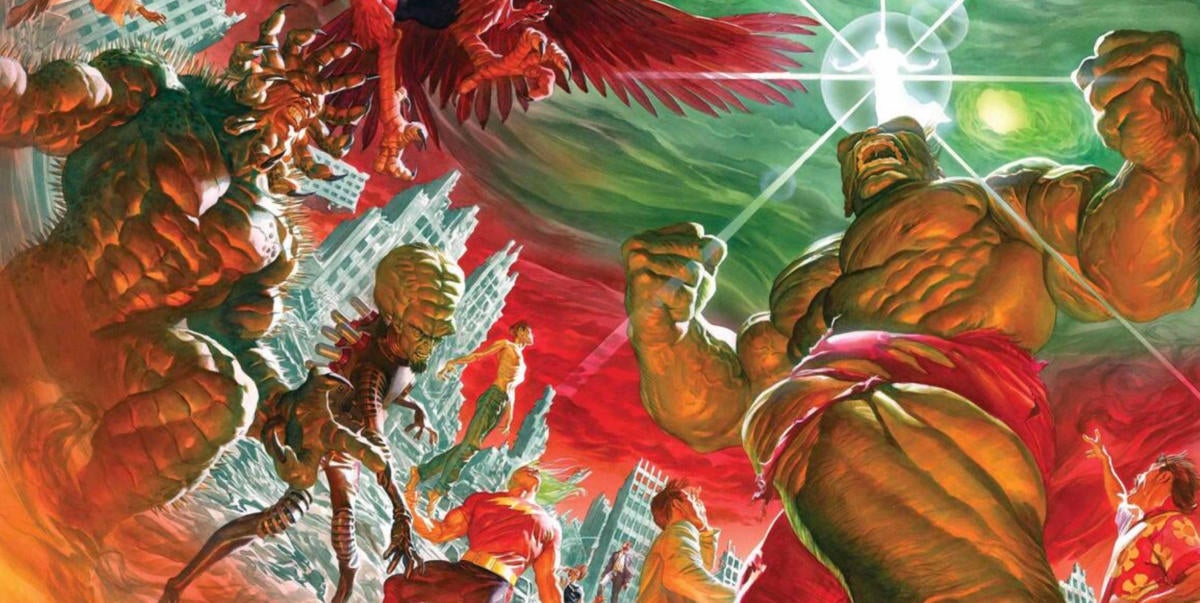The Immortal Hulk #50 Review: The Problem of Evil in Marvel Comics
The Hulk is a character who plays well with that most essential element of all comics: juxtaposition. Comics place images, words, and ideas side-by-side in order to construct new understandings. Hulk functions in much the same way in both literal, as the powerful Hulk and weak Bruce Banner, and metaphorical, as with the childlike Hulk and cynical Joe Fixit. The Immortal Hulk has filtered these contrasts and comparisons through the genres of science-fiction and horror, transforming the concept of gamma radiation into a mythical entity capable of opening the gates to Hell. Yet the existence of Hell suggests the possibility of its opposite and all that entails. The Immortal Hulk may have begun with dark twists on science, but it also began as a morality play and that is exactly where it ends on the grandest scale imaginable.
And so The Immortal Hulk #50 sets out to address the problem of evil.

Even after clearing the decks and delivering only a trio of protagonists to the finale in Hell, this issue utilizes every panel of this 96-page issue well. It’s a necessity for a sprawling narrative which even introduces a new story from the past to frame everything in the present. Spoiling the many revelations of this issue would do a disservice to one of the most masterful runs in modern superhero storytelling, especially one that closes out its story in far greater fashion than most. However, those who are familiar with the problem of evil from philosophy and theology likely already see where this story is directed.
Given that the villains of the piece are The Leader supported by The One Below All—essentially the Devil—the stakes and scope couldn’t get much higher. So it’s no surprise when a childlike Hulk essentially beseeches the universe to explain why the child Bruce Banner had to suffer, to justify the very existence of suffering. It’s a valid question, especially in a universe with higher powers, but answering the question hasn’t become any easier in the millennia since Epicurus posed the question.
That makes writer Al Ewings addressal of the question all the more remarkable. In The Immortal Hulk #1 it seemed possible to address evil with power – a superhuman punch delivered to a child killer. Yet as the story continued and the evils multiplied, growing to include the military-industrial complex among many other complex topics, this childish solution, inherent to the superhero genre, grew unsatisfying. And here Ewing trusts readers to make sense of an apathetic universe filled with unjustifiable and unnecessary suffering alongside the characters so wonderfully rendered by penciler Joe Bennett. The complexity of their reactions plays out in responses and words far more subtle than fans of most Marvel characters have come to expect, much less the Hulk.
Focusing on only two of Banner’s alters, the duo of Joe Fixit and the childlike Hulk perfectly introduced in King in Black: The Immortal Hulk, provides a useful focus and lens on human nature. They balance concepts of innocence and sin, youth and experience, righteousness and resentment. They also provide a useful shared spirit in their response to Hell itself – furious at the existence of evil, whether or not they’ve contributed to its growth. That these differences and unity are imbued in artwork with skillful detailing of facial tics and bone structure alike from inkers Ruy José and Belardino Brabo, and an intriguing final twist on the color scheme by Paul Mounts, makes appreciating the themes at play all the easier.
Even with only two alters and a handful of others at the core of this story, the size of what preceded it results in some of the climax feeling tacked on. Jackie McGee’s narrative neatly parallels much of what Hulk experiences in this issue and provides a more specific lens, but her role within the story and connection to gamma seem hamstrung. Discussions of the Green Door closing and further attempts to put a bow on the climax of this issue read as being out of place, as well, better left as work for whatever #1 follows this.
Beyond some minor quibbles at the end, The Immortal Hulk #50 stands as a colossal climax for one of the most critically and commercially successful superhero series of the past decade. This issue, sized like a graphic novel, reads with the same potency and compelling throughline as the best issues from the run. Even as its climax leaves readers with more to contemplate than cheer, it is the clear destination from where this series began. Questions of science, faith, the worth of man, and the problem of evil have been drawn out through this idiosyncratic tale and its finale confronts them as well as any work in its genre. That ambition alone might be enough to secure The Immortal Hulk‘s place in the Marvel canon, but its ability to deliver an insightful conclusion guarantees it.
Published by Marvel Comics
On October 13, 2021
Written by Al Ewing
Art by Joe Bennett, Ruy José, and Belardino Brabo
Colors by Paul Mounts
Letters by Cory Petit
Cover by Alex Ross
For all the latest Comics News Click Here
For the latest news and updates, follow us on Google News.

